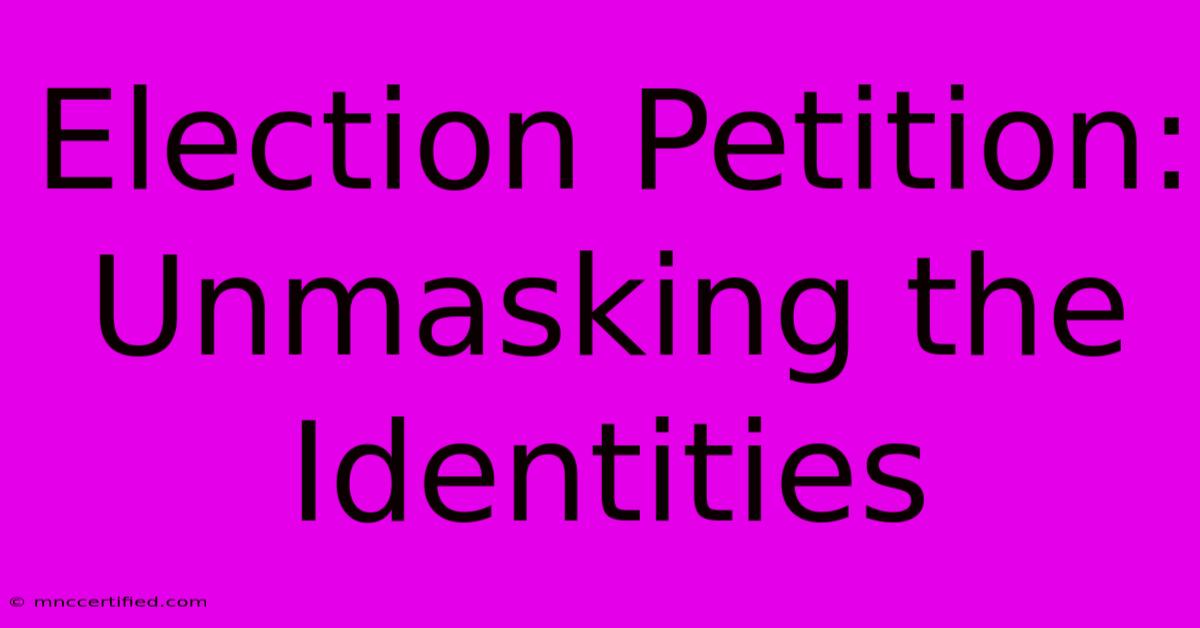Election Petition: Unmasking The Identities

Table of Contents
Election Petition: Unmasking the Identities Behind the Legal Battles
Election petitions, the legal challenges filed after an election, often become intense dramas unfolding in the public eye. Beyond the headlines and political posturing, however, lies a complex web of individuals and interests driving these crucial legal battles. Understanding who's behind these petitions is key to comprehending their motivations and the potential impact on the electoral process. This article delves into the identities involved in election petitions, revealing the diverse actors and their strategic goals.
The Petitioners: Who Challenges the Results?
The most obvious players are the petitioners themselves. These individuals or groups believe the election was not conducted fairly and are challenging the official results. Their identities can vary greatly:
-
Losing Candidates: Frequently, the losing candidate in a closely contested race will file a petition, citing irregularities or voter fraud as grounds for challenging the victor's legitimacy. This is a common and often highly publicized scenario.
-
Political Parties: Larger political parties may sponsor or support petitions, even if their own candidate didn't run in the specific race. This often stems from broader strategic goals, such as weakening a rival party or challenging the integrity of the entire electoral system.
-
Civil Society Organizations (CSOs): These groups, focused on election monitoring and promoting transparency, may file petitions if they identify significant irregularities during the election process. Their focus is often less on specific candidates and more on upholding the integrity of the democratic process.
-
Individual Voters: In some jurisdictions, individual voters can file petitions, often when they believe widespread fraud has affected the outcome, impacting their right to a fair election.
The Respondents: Defending the Outcome
On the other side are the respondents, those defending the election results. These typically include:
-
The Winning Candidate: Naturally, the candidate declared the winner is a primary respondent. Their legal team will work to refute the allegations made in the petition and defend their victory.
-
The Electoral Commission: The body responsible for overseeing the election is almost always a respondent, tasked with defending the integrity of their processes and the validity of the results.
-
Political Parties: Similar to petitioners, political parties can be respondents, particularly if they are supporting the winning candidate or defending the overall electoral system against accusations of widespread fraud.
The Supporting Cast: Lawyers, Experts, and Witnesses
Beyond the principal parties, numerous other actors contribute significantly to the unfolding drama:
-
Legal Teams: Skilled lawyers are crucial, providing legal expertise, crafting legal arguments, and presenting evidence in court. The quality of legal representation can significantly impact the outcome of an election petition.
-
Expert Witnesses: Election petitions often involve complex evidence, requiring the testimony of experts in areas such as election administration, statistics, and forensic analysis to provide credible analyses of electoral data.
-
Witnesses: Individuals who possess firsthand knowledge of alleged irregularities or fraudulent activities are crucial witnesses. Their testimonies are a significant element in determining the validity of the petition's claims.
Unmasking the Motives: Beyond the Legal Arguments
Understanding the identities involved is only part of the picture. Delving deeper into their motives requires critical analysis:
-
Political Gain: For many petitioners, especially losing candidates, regaining power or undermining political opponents is a primary driver.
-
Systemic Reform: CSOs and some individual petitioners may primarily aim to improve election processes and prevent future irregularities, rather than focusing on individual wins or losses.
-
Financial Incentives: In some cases, financial incentives may play a role, either through direct funding of the petition or the potential for future political gains.
Conclusion: The Importance of Transparency
The identities and motivations behind election petitions are essential elements to a fair and transparent electoral system. Public awareness of these actors and their goals allows for a better understanding of the process and contributes to a more informed public discourse about the legitimacy and integrity of elections. Open access to information about funding, legal representation, and witness testimonies promotes accountability and strengthens democracy. The ongoing scrutiny of these identities helps to ensure fair elections and the upholding of democratic principles.

Thank you for visiting our website wich cover about Election Petition: Unmasking The Identities. We hope the information provided has been useful to you. Feel free to contact us if you have any questions or need further assistance. See you next time and dont miss to bookmark.
Featured Posts
-
Nc Boat Insurance Requirements
Nov 27, 2024
-
Vanderpump Rules Returns Season 12 Cast
Nov 27, 2024
-
Dohrn Insurance River Grove Il
Nov 27, 2024
-
Paul Bissonnette Assault Suspects Named
Nov 27, 2024
-
Elizabeth Line Outage Full Day Disruption
Nov 27, 2024